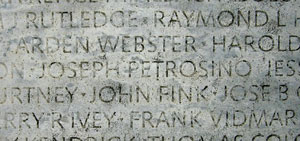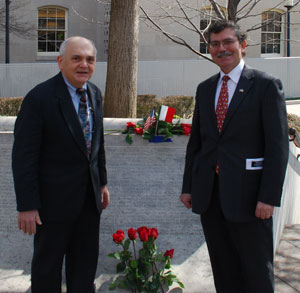|
By Joe Grano*
One hundred years ago on March 12, 1909, Lt. Joseph Petrosino, a N.Y.C. police officer and organized crime fighter was assasinated in Palermo, Sicily.
A larger-than-life figure of great physical courage, Joseph Petrosino was much more than the tough cop, which he certainly was. He was a brilliant innovator and strategist in America’s first war on organized crime in N.Y. He was also, in the words of his friend Teddy Roosevelt, a “great man, a good man.”
Petrosino was born in Padula, a small town near Salerno on Aug. 30, 1860. His father, a tailor, moved the family to the U.S. in 1873. His mother died of small-pox, which Petrosino also contracted. In 1878, he became a citizen.

Because of a need for Italian police officers to work in the burgeoning Italian communities, Petrosino was accepted into the police force, becoming one of its first Italian officers. He was a fearless cop. On one occasion, according to a New York Times report, he saved the life of an African-American man being attacked by three assailants in a street fight. He intervened in the fight and subdued and arrested the three attackers.
He soon became a detective and later was promoted by then-Police Comm. Teddy Roosevelt to Detective Sergeant in charge of the Homicide Division, then the highest rank ever attained by an Italian American police officer in N.Y. Clearly, Roosevelt was grooming Petrosino to deal with crime in the Italian American community.
In 1901, the Secret Service asked Petrosino to infiltrate an Italy-based anarchist organization that had killed King Umberto. Petrosino discovered that one target of the organization was Pres. McKinley and warned the Secret Service to prevent him from visiting Buffalo, N.Y. McKinley did not act on the warning, even after V.P. Roosevelt had vouched for Petrosino’s credibility. Of course, McKinley was assassinated in Buffalo on Sept. 6, 1901, and Teddy Roosevelt became president.
In 1905, Petrosino was given command of a squad of Italian-speaking detectives to deal with crime affecting Italian Americans, including organized crime. It was later named the “Italian Legion.” In this position, Petrosino pioneered many of the techniques still used to fight organized crime.
He set up the first bomb squad to help trace the identity of bomb makers, developed the strategy of disrupting gang activities and deporting leaders. He also used witness protection and intelligence gathering programs. During his time as Legion chief, crime in N.Y.’s Italian-American community was cut in half; 500 criminals were deported.

Obsessed with crime fighting Petrosino postponed marriage until 1907, when he married Adelina Vinti. The following year, a daughter, Adelina, was born.
In 1909, Police Comm. Gen. Theodore Bingham sent Petrosino on a top-secret mission to Palermo. But his cover was blown when the Herald Tribune published a story on the forthcoming trip. The source of the story was the police commissioner, himself. By the time Petrosino arrived in Palermo, organized crime figures there were prepared.
On March 12, 1909, he was lured into an ambush by a supposed informant in Palermo, and shot to death. Vito Cascio Ferro, a notorius criminal whom Petrosino had hounded out of N.Y. and who had returned to Sicily, was arrested for the murder. But he was eventually released. The Petrosino murder remains officially unsolved.
His body was brought back to N.Y. and his funeral took place on April 12 at the old St. Patrick’s Cathedral. The Mayor and the Police Commissioner attended. It is estimated that more than 200,000 people witnessed the funeral procession and more than 60 Italian–American societies participated. Officials declared the day a holiday; flags in the city flew at half-staff.
At the funeral mass, the story was told that before leaving for Sicily, Petrocino had visited his parish priest, who had told him: “Do not go to Italy because I am afraid that you will not return alive.” Petrosino had smiled and replied: “Probably not, but it is my duty to go and I am going.”
Petrosino and his widow, who died in 1957, are buried in Calvary Cemetery in Queens, N.Y. •
*Joseph N. Grano is the Chair of the
Constantino Brumidi Society
(Article first appeared in Voce Italiana, Washington, DC, March 2009)
(Pictured above Joe Grano with Francesco Isgro at the National Law Enfocement Officers Memorial where Petrosino's name is engraved.
|

![]()

